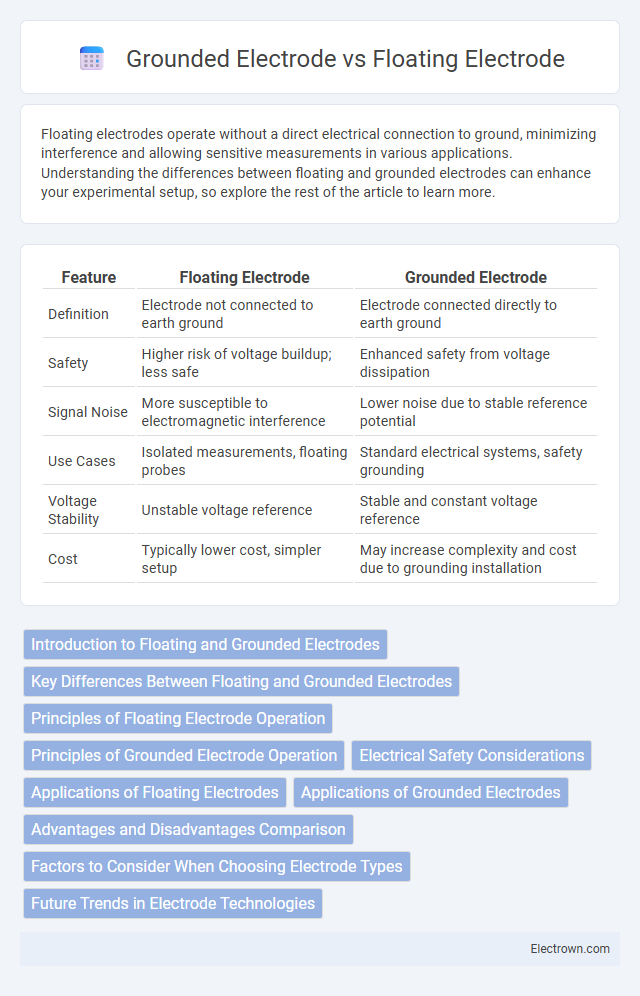Floating electrodes operate without a direct electrical connection to ground, minimizing interference and allowing sensitive measurements in various applications. Understanding the differences between floating and grounded electrodes can enhance your experimental setup, so explore the rest of the article to learn more.
Table of Comparison
| Feature | Floating Electrode | Grounded Electrode |
|---|---|---|
| Definition | Electrode not connected to earth ground | Electrode connected directly to earth ground |
| Safety | Higher risk of voltage buildup; less safe | Enhanced safety from voltage dissipation |
| Signal Noise | More susceptible to electromagnetic interference | Lower noise due to stable reference potential |
| Use Cases | Isolated measurements, floating probes | Standard electrical systems, safety grounding |
| Voltage Stability | Unstable voltage reference | Stable and constant voltage reference |
| Cost | Typically lower cost, simpler setup | May increase complexity and cost due to grounding installation |
Introduction to Floating and Grounded Electrodes
Floating electrodes are electrical conductors isolated from the ground, allowing them to detect potential changes without a direct connection, enhancing signal sensitivity in certain sensor applications. Grounded electrodes connect directly to the earth or reference potential, ensuring stability and reducing electrical noise in measurement systems. Your choice between floating and grounded electrodes significantly impacts accuracy and interference susceptibility in electrochemical or biomedical experiments.
Key Differences Between Floating and Grounded Electrodes
Floating electrodes operate without a direct electrical connection to the ground, which minimizes interference and allows for more sensitive measurements in electrochemical systems. Grounded electrodes are connected to the earth or a reference point, providing a stable potential that reduces noise and enhances safety in high-voltage applications. Understanding the key differences between these types ensures your choice optimizes accuracy and safety in your measurement or electrical setup.
Principles of Floating Electrode Operation
Floating electrodes operate by maintaining electrical potential without direct connection to the ground, using capacitive coupling to detect changes in the surrounding electric field. This principle allows for sensitive measurement of bioelectrical signals with minimal interference and reduced noise in applications such as electroencephalography (EEG) or electromyography (EMG). The floating electrode's isolation from ground enhances signal fidelity by preventing common-mode currents and grounding artifacts.
Principles of Grounded Electrode Operation
Grounded electrodes operate by providing a direct electrical connection to the earth, ensuring safety by dissipating fault currents and stabilizing voltage levels. This principle helps protect electrical systems from surges, reducing the risk of electric shock and equipment damage. Your electrical setup benefits from a reliable grounded electrode by maintaining system integrity and preventing hazardous electrical conditions.
Electrical Safety Considerations
Floating electrodes reduce the risk of electric shock by isolating the circuit from the ground, minimizing current flow through unintended paths during faults. Grounded electrodes provide a reference point that stabilizes voltage levels and allow for safe dissipation of fault currents, enhancing protection for equipment and personnel. Understanding your system's electrode configuration is crucial for implementing effective electrical safety measures and preventing hazardous conditions.
Applications of Floating Electrodes
Floating electrodes are commonly used in biosensors and electrochemical cells due to their ability to reduce interference and improve signal stability in complex environments. These electrodes enable precise measurement of ionic currents without a direct electrical connection to the reference ground, making them ideal for wearable health monitors and implantable devices. Their application spans medical diagnostics, environmental monitoring, and flexible electronics where isolation from ground potential enhances sensitivity and accuracy.
Applications of Grounded Electrodes
Grounded electrodes are widely used in electrical grounding systems to ensure safety by directing fault currents safely into the earth, preventing electric shocks and equipment damage. They are essential in power distribution networks, substations, and lightning protection systems to stabilize voltage levels and protect infrastructure. Industrial machinery and residential electrical systems also rely on grounded electrodes to maintain proper functioning and safety compliance.
Advantages and Disadvantages Comparison
Floating electrodes offer improved isolation and reduced interference by not being directly connected to a reference ground, making them ideal for sensitive measurements in noisy environments. However, they can suffer from instability and potential drift due to floating potentials, which may complicate signal interpretation. Grounded electrodes provide stable and consistent reference levels, enhancing measurement reliability but are more susceptible to ground loop noise and interference in complex electrical systems.
Factors to Consider When Choosing Electrode Types
When choosing between floating and grounded electrodes, consider factors such as electrical safety, signal interference, and application environment. Floating electrodes offer isolation from ground loops, reducing noise in sensitive measurements, while grounded electrodes provide a stable reference point, essential for high-current applications. Your decision should align with the required signal integrity, equipment compatibility, and environmental conditions to ensure optimal performance.
Future Trends in Electrode Technologies
Future trends in electrode technologies emphasize the integration of floating electrodes to enhance signal stability and reduce noise in wearable and implantable medical devices. Advances in materials science are driving the development of flexible, biocompatible grounded electrodes that improve patient comfort and long-term monitoring accuracy. Emerging hybrid electrode systems combine floating and grounded designs to optimize electrical performance in neuroprosthetics and bioelectronic applications.
Floating vs Grounded Electrode Infographic

 electrown.com
electrown.com